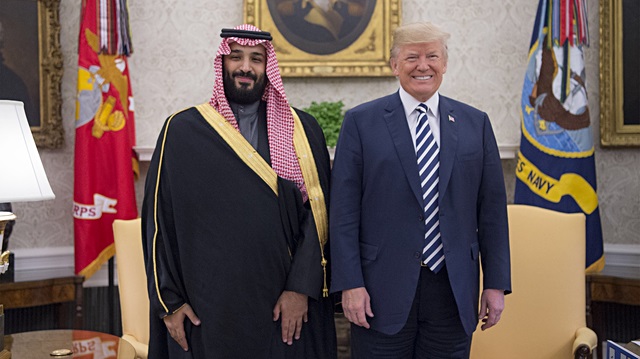
With Trump’s support and the friendship of his son-in-law Jared Kushner, it is likely that top Saudi royals will emerge unscathed while the operatives involved will face harsh punishment
Middle Eastern news headlines have dramatically shifted over the past couple of weeks from the usual fare of Syria, Iraq and Palestine to diplomatic intrigue and stories of assassins murdering journalists. Saudi dissident and Washington Post columnist, Jamal Khashoggi, is feared dead after he was seen entering the Saudi Arabian consulate in Istanbul, but never left. What followed was a flurry of accusations, denials and shuttle diplomacy to extinguish the fires left in the wake of Khashoggi’s disappearance and alleged murder.
- Who is Khashoggi?
What is perhaps most incredible to me is the sheer outpour of rage directed at the Saudi state for Khashoggi’s disappearance. The outrage is unsurprising, given news stories have suggested that the Saudi columnist was brutally interrogated by a 15-man hit squad sent by Riyadh before being tortured to death [1] over a period of around seven minutes. According to reports, Khashoggi’s body was subsequently dismembered before being made to disappear.
This has led to calls for the protection of journalists from state-backed assassins. The main problem here is that Jamal Khashoggi was not a conventional journalist.
Khashoggi has had a deep and well-documented connection with the Saudi state since the Soviet invasion of Afghanistan [2], where he worked with the Kingdom’s intelligence service as Riyadh and Washington both supported the jihad against the USSR. He worked as a journalist and travelled throughout Afghanistan, the Middle East and North Africa, likely reporting what he learnt to intelligence handlers.
His relationship with high-ranking Saudi royals is also no secret, as he was an advisor to Prince Turki Al Faisal, who was Saudi Arabia’s ambassador to the United States as well as the head of the Kingdom’s intelligence service for 24 years between 1977 and 2001. Far from being a dissident opposed to the Saudi state at a fundamental level, it is important to note that Khashoggi was very much supportive of many of his country’s policies despite his progressive and reformist bent, and had only taken a stand against Riyadh recently, following Crown Prince Mohammad bin Salman’s (MBS) rise to power.
- US-Saudi relations likely to remain stable
Although Khashoggi was not a U.S. citizen, he was a permanent resident there and worked for one of the most high-profile newspapers in the country. Therefore, his disappearance has raised hackles and not just eyebrows in Saudi Arabia’s closest ally and backer.
Indeed, U.S. President Donald Trump threatened “severe punishment” [3] if it turned out that Saudi Arabia had ordered a hit on the columnist. While Trump would not be drawn on exactly what he meant by punishment, he did say that he would not stop selling arms to Saudi, a country that is currently involved in a military intervention in Yemen against the Iran-backed Houthi Shia militants.
Trump also took the crisis as a callous opportunity to essentially squeeze Riyadh for more money, making a speech days after Khashoggi’s disappearance saying that, although he liked King Salman bin Abdulaziz, the Saudi monarch “wouldn’t last two weeks” [4] without US support. As such, Trump said it was only fair that Riyadh paid more for American protection, and as soon as Secretary of State Mike Pompeo landed in the Saudi capital, $100 million was delivered to Washington’s coffers [5].
The U.S. administration will continue to protect the Saudi monarchy quite simply because Riyadh’s wealth is so vast. Although Senator Lindsey Graham, normally a staunch supporter of Saudi Arabia, has taken the unusual step of calling on MBS to be ousted by his family as he is a “wrecking ball” [6], Trump has defended the Saudi government, saying that they would be considered innocent until proven guilty [7].
Arguably, Trump has a point. To date, there has been a media frenzy surrounding the Khashoggi case, and primarily because the antagonist in this story is Saudi Arabia. There is certainly no doubt about it being suspicious that Khashoggi entered the Saudi consulate and never came out. However, no one yet knows what happened to the Saudi columnist, and most of the information comes from anonymous sources. It is important that authorities provide factual material to media agencies rather than what so far amounts to speculative tidbits that serve to enflame an already tense situation.
The pressure caused by the media furore apparently has the Saudi authorities now considering admitting to Khashoggi’s death at the hands of “rogue” agents who may have accidentally killed the journalist in a rendition operation gone horribly wrong. Still, with Trump’s support and the friendship of his son-in-law Jared Kushner, it is likely that top Saudi royals will emerge unscathed while the operatives involved will face harsh punishment. The true tragedy, however, will be that we may never know truly what happened to Jamal Khashoggi, and we may never see his case brought to a just conclusion.
[1]











